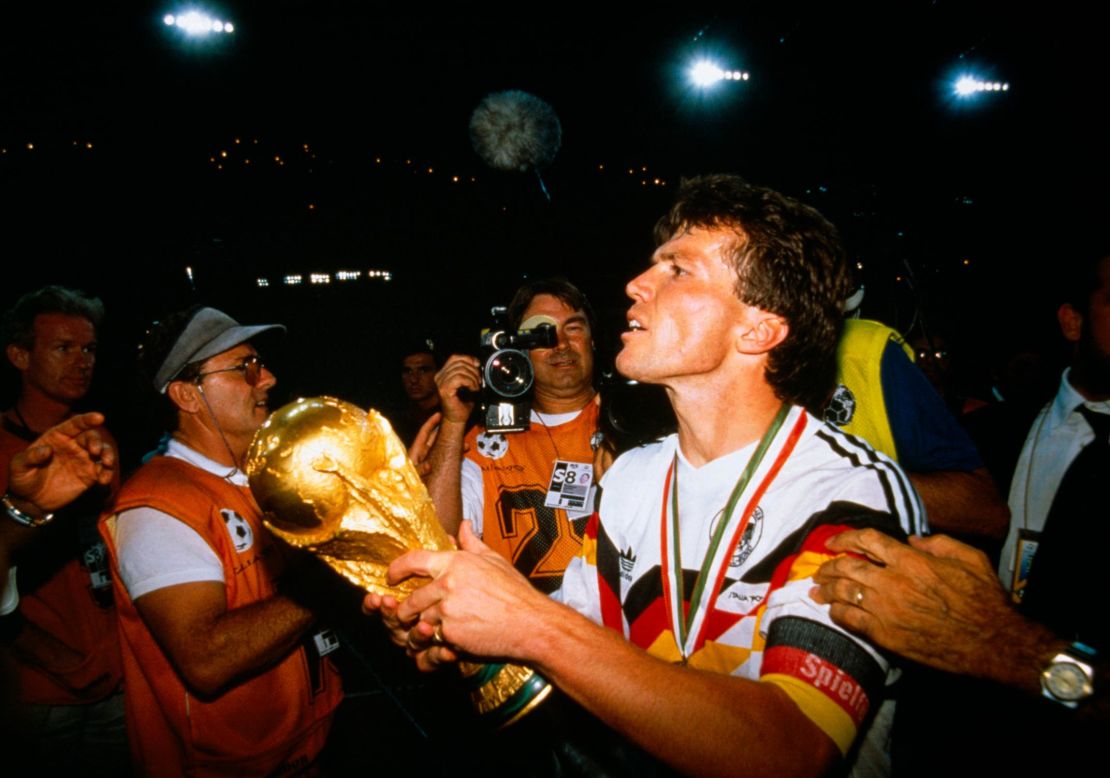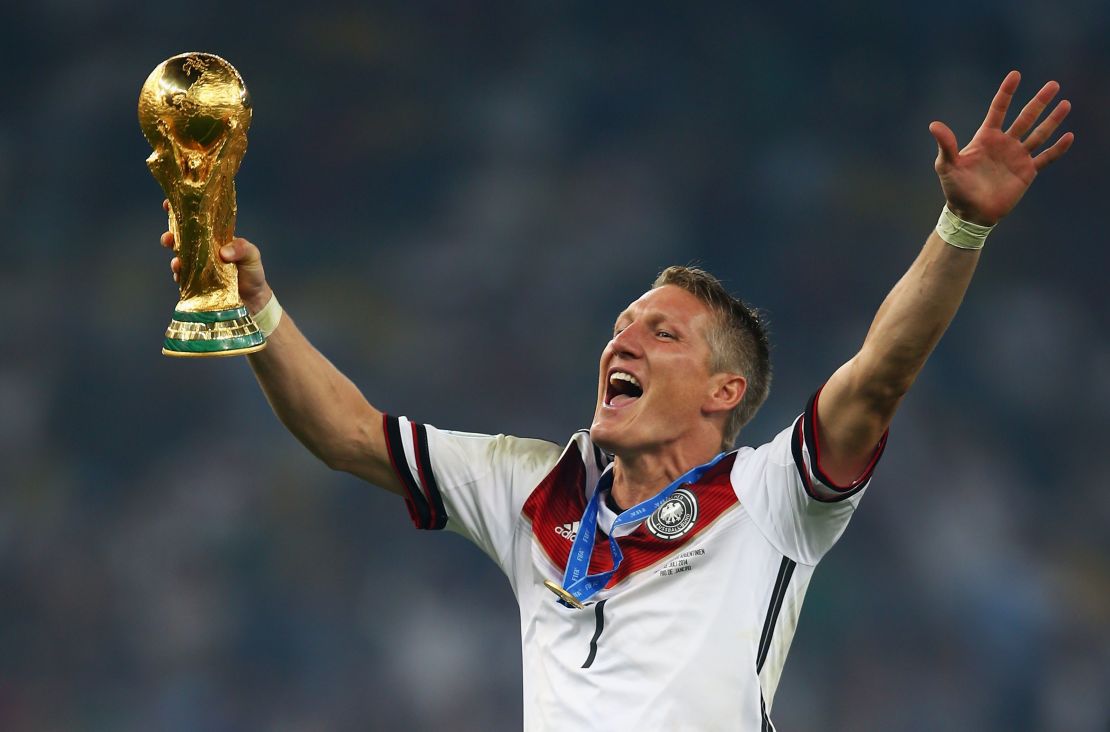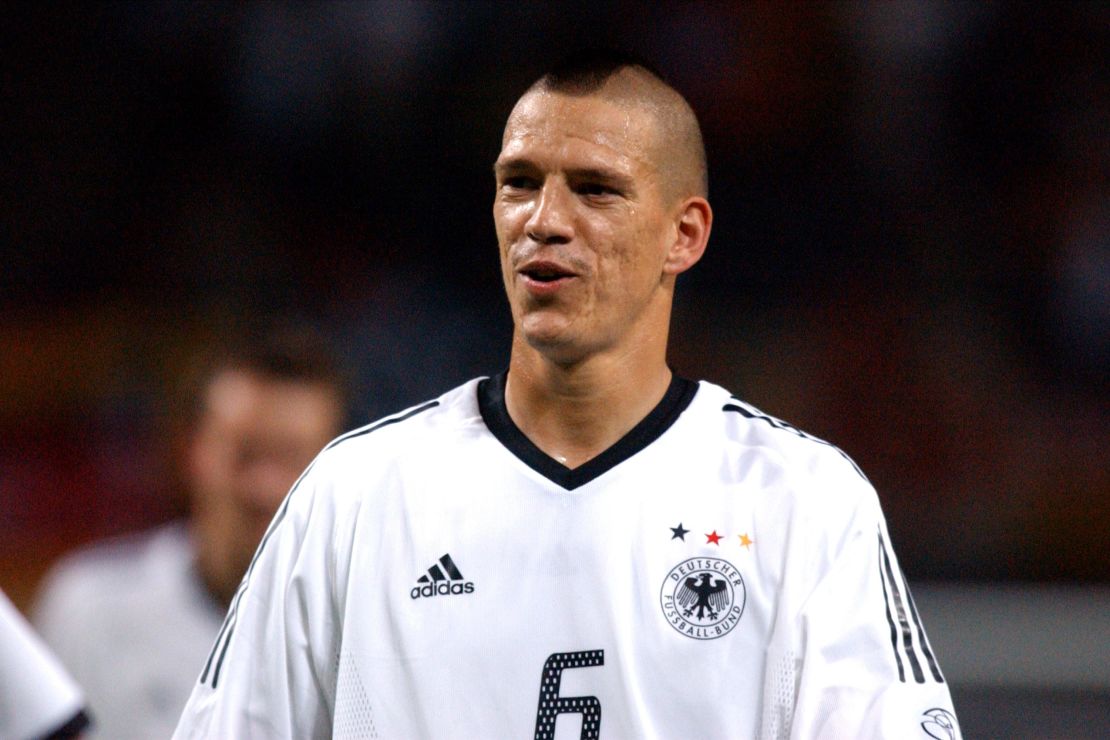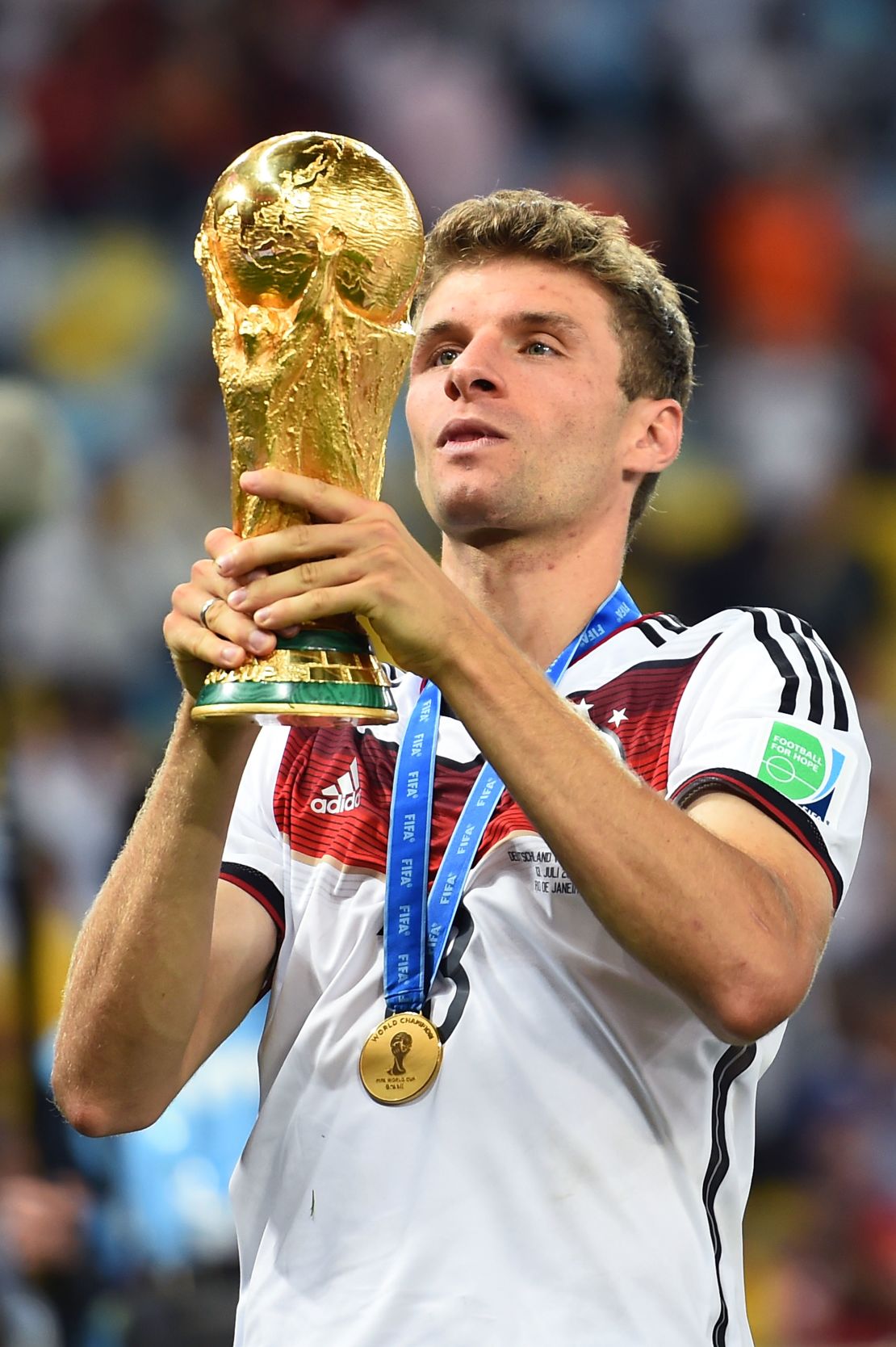They stand on the brink of history, ready to add a record fifth star to the badge and become the first nation to retain the World Cup since Brazil in 1962.
It’s business as usual for Germany.
Head coach Joachim L?w has guided Die Mannschaft to at least the semifinals in each of his last five major tournaments. The current team qualified from Group C with a perfect record of 10 wins from 10 and a goal difference of +39.
Few would bet against them once again in Russia.

After all, football’s a simple game. As former England striker Gary Lineker once put it, 22 men chase a ball for 90 minutes and at the end the Germans win.
But that hasn’t always been the case.
Around the turn of the millennium, it was a footballing nation in crisis. An aging squad exited the Euro 2000 group stages in ignominy without a single win to their name.
“The Germans were always believing in power and mentality, but not quality in the teaching of their youth teams,” former captain Lothar Matth?us tells CNN Sport, speaking of the prevailing attitude at that time.
“This was maybe the reason that, after the 2000 European Championship, Germany went a new way – a better way for the future.”

A task force of the German Football Association’s finest minds gathered with a view to revolutionizing the game from top to bottom.
No stone would be left unturned in the search for talent. The national team, as Bayer Leverkusen CEO Wolfgang Holzh?user put it, would henceforth be regarded as “the 19th and best team in the Bundesliga.”
“It was very much the watershed moment,” German football journalist Archie Rhind-Tutt tells CNN Sport. “We can see the fruits of that labor now.”
READ: Your country needs you! What nationality means to the modern-day footballer
Depth
Looking at the wealth of talent available to L?w in Russia, it’s quite possible to pick at least four entirely distinct starting XIs capable of advancing to the latter stages of the tournament.
It is testament to such riches that neither André Schürrle nor Mario G?tze, the players that combined to win Germany the last World Cup in extra time, even made the preliminary squad this time around.
READ: Leroy Sane one of the notable players not going to the World Cup

“We have in Germany a lot of good, young, talented players,” former captain Bastian Schweinsteiger tells CNN Sport. “It’s not easy for our head coach to choose the starting 11 or even the the full squad.”
That German football fans engage in fierce debate over who should be their third-choice goalkeeper typifies the present situation.
What they’ve done “is not rocket science,” though, according to football journalist Rapha Honigstein.
“They’ve taken ideas from France; they’ve taken ideas from England; they’ve taken ideas from Holland; and they’ve just put lots of firepower, know-how and of course a very strong infrastructure behind that,” Honigstein tells CNN Sport. “And the result is you’re just pumping out talent.”
READ: France’s ‘Rainbow team’ looks back on historic win twenty years on
Youth
Both Honigstein and Rhind-Tutt contrast the invaluable education German players receive with that of their English counterparts, pointing to the Premier League “bottleneck” that often prevents youngsters from getting first-team football.
Having talent is one thing; actually deploying it is quite another.

Former defender Christian Ziege, a World Cup runner-up in 2002, puts Germany’s success down to the domestic game’s reliance on youth.
“I played myself with the Germany youth team against England in the past and I think they have so many good players,” says Ziege, who has since gone on to coach the likes of Marc-André ter Stegen, Matthias Ginter and Timo Werner while working with Germany’s Under-18 and U19 teams.
“The only problem is they’re not going to play in the Premier League because the top clubs are more or less only using players with experience that cost a lot of money.
“The good thing is when you can’t spend too much money, you can put young players into the teams. They get that experience; they can play.
“We sent a team for the Confederations Cup without nearly all the main players and ended up winning that trophy as well.”
The squad that Ziege speaks of boasted an average age of just 24 – the youngest at the tournament – but rallied to win the World Cup warmup in style.
From headbutts to the 'Hand of God': 11 moments that defined the World Cup
Instilling a winning mentality at an early age can only be beneficial, according to Matth?us, who led Germany to glory at Italia 1990.
“From these academies, the national team profits,” says the former defensive midfielder, who remains the only player to appear in five different World Cups. “They are ready when they get the invitation. When they get the chance to play, they will show the quality of men.”
READ: Maradona and ‘the only miracle of the 20th century’
Mentality
Rival fans talk enviously of the so-called “German mentality,” using the phrase as shorthand for ruthless efficiency in the will to win.
“You can see it not only in football, but in the cars,” jokes Matth?us. “We have the best cars around the world – with BMW, Audi, Volkswagen, blah blah blah! We like to always do the best, and for this you have to work very hard.
“We are never satisfied. We always do the next step. And I think this is the German mentality.”
But for Ziege, who amassed 72 caps between 1993 and 2004, “something has changed a little bit … and that’s the reason we have so much talent now in our football.”
The new generation is cut from a different cloth, the former Bayern Munich defender suggests, with an increasingly cosmopolitan squad adopting a more cultural approach both on and off the field.
Is the “German mentality” a myth? It depends who you ask and what you mean.
Both Schweinsteiger and Matth?us, Germany captains who have lift the coveted trophy, put their triumphs down to intangible qualities within the camp.
“I would say it’s to have a feeling for everyone – to understand every single person, exactly how they are,” says Schweinsteiger, when asked for the secret to Germany’s success during his time in the side. “Their character, their personality, which things they like, which they don’t like.
“You have to oversee everything, which costs a lot of energy. But if you have experience and you know how to handle it, it’s also kind of fun.”

It’s an answer echoed by Matth?us, who also – perhaps surprisingly – singles out the importance of fun in the long weeks away.
“First you need the quality of the players, the right system, but the team spirit is very important,” the 1991 World Player of the Year explains.
“From the first day we began preparation, two weeks before the World Cup, we had a feeling that we were working with 23 players together, and this is the most important thing.
“Not only in the final, not only when I got the cup – generally the atmosphere in the team in the whole six, seven weeks when we were together was amazing. How we worked together, how we respected each other, how much fun we had. And then we had the results.”
Innovation
German football identified a malaise, took the time to solve it, and is now reaping the rewards.
But in such a competitive environment, complacency is the first step toward decline.
A vintage year for England youth teams
England
“For me, it goes around a little bit,” muses Ziege. “In my time, France was the country with the best young players. Then it dropped a bit to Spain, when they had their new ideas from Barcelona. Then we [Germany] had a problem and we changed everything.
“And now if you see the English teams just in the last six months, they have won a lot of trophies in the youth competitions.
Last November, Germany general manager Oliver Bierhoff admitted he was “worried” by the quality of England’s youth, saying with the introduction of national football center St. George’s Park, their rival is “catching up.”
England, destitute in major tournaments since a solitary World Cup win back in 1966, lifted both the U17 and U20 World Cups in 2017, also triumphing at the U19 European Championships and U20 Toulon tournament.
“It takes some time,” said Bierhoff. “We started in 2000 and the first result was in 2010 with new young, talented players.”
Matth?us isn’t concerned about other nations replicating what Germany has done – telling CNN Sport “we copied France, we copied Switzerland!”
But for Honigstein, there “isn’t really a model that can be copied, because you cannot translate it into countries.” Instead, he contends it’s “a constant battle for innovation and keeping an edge.”

“Germany, because of the numbers and underlying strength of the system, will always be one of the superpowers,” Honigstein says. “But they’re working much harder than before in keeping that edge, wherever it may be: the tactical level or in terms of technology, which they used quite a lot at the last World Cup.
“And that battle, just as it is in club football, is just going to intensify as more and more federations wake up to the possibilities and challenges of international football.”
Unity
It’s indicative of Germany’s pedigree that they remain among the favorites despite flying to Russia on the back of just one win in six preparatory friendlies.
“I think Germany will play to win the World Cup,” says Matth?us. “We have really experienced players, we have talented players, we have good goalkeepers, we have good goalscorers, we have good midfielders, we have good defenders.”

Honigstein believes they can “absolutely” become the first team to retain the trophy for more than half a century, placing the Germans on a pedestal alongside France and Spain “give or take a few percentage points,” followed by Brazil.
What's the secret behind Germany's success?
Lothar Matth?us
“From the first day – when we began preparation, two weeks before the World Cup – we had a feeling that we were working with 23 players together, and this is the most important thing. When Lionel Messi is injured for Argentina, Argentina is no longer Argentina. If you miss a player, it’s very important you don’t lose the overall quality in your team.” Bastian Schweinsteiger
Meanwhile Schweinsteiger, their fourth most capped player of all time, is quietly optimistic ahead of his first major tournament on the sidelines since 2002.
“I hope that we can defend our title, but we will see – it’s never easy to play a World Cup,” says the 33-year-old. “We have a very strong team and I’m one of the biggest supporters!”
For Matth?us, it’s all about the strength of the collective.
“If you miss a player, it’s very important you don’t lose the overall quality in your team,” he stresses. “When [Lionel] Messi is injured for Argentina, Argentina is no longer Argentina.
“I think you need players who are sitting on the bench that don’t make problems sitting on it, but when they come on the field, they have the same quality as the player they replace.”
What are Germany’s chances of retaining the World Cup? Have your say on CNN Sport’s Facebook page
Visit CNN.com/sport for more news and features
“Everything is possible but we know we don’t get a present,” Matth?us adds. “We have to work very hard. We have to focus for five weeks only on the football. We have to play seven games. When you make one mistake in these four or five weeks, you will go out, and you can watch the final on the television.
“This is the problem, but I think we have the quality to win again.”
CNN’s Elizabeth Perez & Kate Riley contributed to this feature











